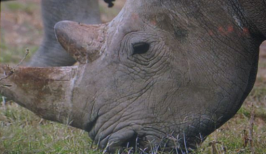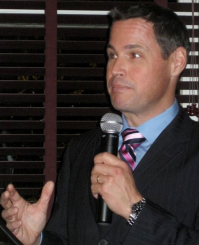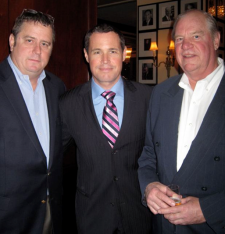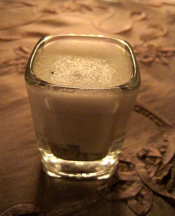Jordan Wright
Georgetowner/Downtowner
November 2009

The rare white rhino from MSNBC's 100 Heartbeats
Setting the stage for extinction: Every twenty minutes a distinct species of plant or animal throughout the world becomes extinct.

Jeff Corwin speaks about his new book and MSNBC special 100 Heartbeats - photo credit Jordan Wright
There is an aura surrounding Jeff Corwin. It is the peaceful intent of a man who has witnessed fierce struggle, mortal threats, man’s inhumanity, heart-pounding danger and crushing heartbreak and emerged to dedicate his life to saving the planet’s rare and endangered species. This is not your son or daughter’s jocular Animal Planet guide tiptoeing through the friendly jungles with weird and eclectic animals, nor the boyish rake abandoning all sensibility to get just a bit too close to an unpredictable viper. This is a man committed through thought, word and deed to altering the predicted fate of our planet’s endangered animals. In my encounter with Corwin I could read the intensity and conviction on his face as he spoke of his up-close-and-personal encounters with the cheetahs and white rhinos whose days appear numbered.
100 Heartbeats – The Race to Save Earth’s Most Endangered Species is Corwin’s paean to the animals. He has found a powerful voice after 15 years of television as an Emmy-award winning producer and host of over a dozen television series for Discovery, Disney, the Food Network, NBC, CNN and the Travel Channel. The two-hour special on the book’s subject is the second program in MSNBC’s epic Future Earth series scheduled for launch this week on November 22nd.

Chef Robert Wiedmaier, Jeff Corwin and Prime Seafood's Jim Chambers - photo credit Jordan Wright
In honor of sustainability the book launch at the Occidental Grill showcased a number of wines that foster sustainable and environmentally responsible practices. Naked by Snoqualmie vineyards, Ste Michelle and Yealands of New Zealand, noted DC Chef Robert Wiedmaier gave their sauvignon blanc the nod. Wild-caught Coho salmon and wild Georgia white shrimp from Prime Seafood, and heritage beef and turkey from Ayrshire Farm in Upperville, VA became luscious hors d’oeuvres in the creative hands of Chefs Rodney Scruggs and Robert Townsend.

Sustainably-raised oyster stew shooter created for the evening by Chef Rodney Scruggs - photo credit Jordan Wright
I had an opportunity to speak with Jim Chambers, manager and owner of Prime Seafood of Kensington, MD who as a marine biologist spent 20 years with the government agency, National Marine Fisheries Service (NMFS). While on the board of the Marine Stewardship Council he was instrumental in setting up the standards for the industry. Jim is the only wholesaler in our area selling exclusively sustainably raised seafood to select local restaurants. Poste, 701, Proof, Johnny’s Half Shell, Corduroy, Firefly, Restaurant Nora, Cashion’s Eat Place and the Occidental Grill and Seafood are some of his DC clientele.
From April through December he sells wreckfish that is similar in flavor and texture to grouper, but sustainable through controlled fishing. Only four boats are licensed to capture these fish off the coast of Charleston, SC in deep water at the base of a “wrecked” submarine wall.
Chambers really enjoys way the fish is being prepared sous-vide at Blue Duck Tavern. “They cook it low and slow in a vacuum-sealed pouch and finish it off with a quick browning. It’s so delicious…tender and succulent, ” he said.

New Zealand's Yealands Sauvignon blanc - photo credit Jordan Wright
Science Magazine recently reported that, if we keep destroying habitat, the world’s fisheries will collapse by 2048. “With unrestrained overfishing we are racing pell-mell towards the destruction of our seas. We now catch the top predators, bottom predators and everything in between with massive fishing trawlers equipped with huge drag nets and sophisticated electronics such as sonar and GPS,” Chambers warned. “We are fast working our way through what is left.”
We talked about the interdependency of the species…how the little fish sustain the bigger fish and how bottom-dragging nets take out 100% of the herring leaving the predator tuna without sustenance and faced with extinction along with their tiny friends.
Our conversation then turned to the darker side of farm-raised fisheries. A recent study concerning farm-raised salmon vs. Chilean vs. Scottish salmon sold in US supermarkets, compared their contaminant load…the amount of chemicals measured in the fish. All of them rated poorly.
“Fish are fed with other fish containing PCBs, DDT, and other organic toxic compounds. In fact only one meal per month of farm-raised salmon, often misleadingly labeled organic, poses a substantial cancer threat to the consumer. They receive growth hormones to make them grow faster while being constantly doused with chemicals to keep the disease level manageably low,” he related.
“You’re creating a sewer in the water where they are being raised. And the parasites, like sea lice, that live on the outside of the nets are getting to the salmon in the net pens where they are being fed dyes to achieve the proper color,” Chambers told me.
This is the tragic underbelly of the fishing industry and a real eye-opener. “It takes about four pounds of juvenile species of wild fish to make one pound of farm-raised salmon. It’s totally unsustainable.”
Chambers takes heart with the appointment of NOAA’s new administrator, Jane Lubchenco, who is also in charge of the NMFS. As one of the most highly cited ecologists in the world, Lubchenco is considered a world expert on marine eco-systems.
Chambers suggests that, “Consumers and chefs in particular can become the solution by what they choose to eat and serve.” With the Blue Ocean Institute’s “Guide to Ocean Friendly Seafood”, a copy of which he graciously gave me, and will be my new seafood-buying bible, he hopes that those who enjoy fish will make better and more informed choices.
For more information visit these websites:
www.FutureEarth.MSNBC.com
www.PrimeSeafood.com
www.BlueOcean.org
www.MSC.org
www.ScienceMagazine.org
For questions and comments on this story contact me at [email protected] or visit www.whiskandquill.com .
Leave a Reply